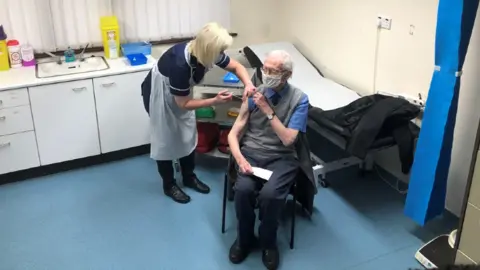Covid: NHS given 'as many vaccines as it can cope with'
 Getty Images
Getty ImagesThe NHS is being supplied with as many Covid-19 vaccines as it can cope with, according to a leading doctor.
Dr Gill Richardson, chair of Wales' vaccination board, said health boards were receiving doses they asked for.
On Friday, First Minister Mark Drakeford said the supply of the Pfizer vaccine was being "spaced out" as it had to last until a delivery in February.
But opposition parties questioned why supplies were being "spread out".
Paul Davies, leader of the Conservatives in the Senedd, said it was "important now to get those vaccines out to people".
Plaid's health spokesman Rhun ap Iorwerth added it made "little sense" to spread out the vaccines, when "time is of the essence".
But a Welsh Government minister defended the rollout and said the vaccine infrastructure is "growing".
"We're moving from a situation where we were using 50% of the stock for first vaccine to a situation where we are now using 100%," Counsel General Jeremy Miles told the BBC's Politics Wales show.
"In order to deliver that, the infrastructure for vaccinating needs to be increased and that infrastructure is being brought forward."
The Tories have called on the Welsh Government to appoint a vaccination minister like Prime Minister Boris Johnson has done in England.
"It would make a huge difference because this minister would be able to focus on the vaccination programme and nothing else," said Mr Davies.
Wales was expected to receive 100,000 doses of the second vaccine - the Oxford-AstraZeneca jab - this week but about a quarter are delayed after failing the regulator's tests.


Dr Richardson said deliveries of the vaccines have arrived in "pulses" and a big consignment of the Pfizer vaccine - around 170,000 doses - arrived in late December.
Half the vaccine was initially held back for booster jabs, but they are now being given to people as a first jab in a bid to get as many people vaccinated - and given some protection - as possible.
Dr Richardson said they were only giving health boards what they could cope with as, after coming out of deep-freeze storage, the Pfizer jab has to be used within five days.
"We are very conscious that we need to get this out there," she told BBC Radio Wales' Sunday Supplement.


"I know that my colleagues are desperate to immunise our vulnerable people.
"We are now able and have been pushing all the vaccine that our health boards can cope with out to them."
There has been criticism that the rollout of the vaccine has been slower in Wales than in other parts of the UK.
Wales has received about 250,000 doses of the Pfizer/BioNTech vaccine and 50,000 doses of the Oxford-AstraZeneca vaccine so far.


The Welsh Government said it had been assured it would get more Pfizer vaccines by February, despite shipments of it being temporarily slowed because of changes to the company's manufacturing processes.
Dr Richardson said: "We are going to have a famine, if you like, of Pfizer deliveries at the end of the month.
"That hasn't stopped us pushing out as much vaccine as we can to the health boards.
"But their clinics will run out of the Pfizer vaccine if more does not come."
Why has one batch of vaccines been delayed?

The Welsh Government said one Oxford-AstraZeneca batch out of four had been delayed, affecting 26,000 doses due to be sent to Wales' seven health boards.
Betsi Cadwaladr University Health Board, which manages the health service in north Wales, said it had advised GPs "may wish to delay appointments early next week" with the planned supply reduced.
BBC Wales has contacted the other health boards in Wales to ask if vaccination appointments have been affected, but they have not given details.
Dr Richardson said while it was "a huge issue for this week, it won't be an issue overall for the programme, we are hoping, because we have been reassured by the UK government that supplies (of the Oxford vaccine) are on their way".
Any GPs affected will be prioritised for the next batch of vaccine, she said.
Asked if he could guarantee supplies to Wales, Welsh Secretary Simon Hart told the programme: "Yes, I think I can."
He added: "There will be the odd occasion when a consignment is rejected or delayed. Nobody should panic about that."
